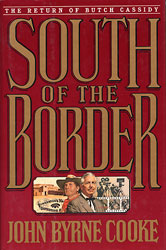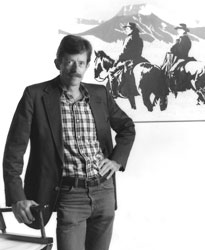Text Selection
Leaving the clamor behind, Leroy decided to look for a rooming house up by the Hollywood hills. Late in the afternoon he came on a fair piece of countryside that no enterprising citizen had yet thought to irrigate for crops. He was stopped in the bottom of a wash, watering himself and his horses, when he first heard the whooping and looked up to see what it was all about.
What he saw was Victoria--though at first he couldn't tell she was a woman--with a dozen bloodthirsty Indian braves hot on her heels. She had her matched set of silver-plated, pearl-handled Colt's revolvers in her hands and every now and then she would turn in the saddle and blaze away at her pursuers. And I'll say one thing for Victoria. If she had live ammunition, she is one of the few people I know, men included, who could put two of Sam Colt's shooting instruments to profitable use against Indians or any other enemy, having been trained in the art of fancy shooting by yours truly. But of course in her present line of work she carries two just for the show.
To give Leroy his due, he didn't stop to wonder what in blazes was going on, not yet. He just grabbed his gun and headed for cover as natural as if he were still a boy back in the Rocky Mountains, where he had imagined such adventures daily throughout his youth, regretting that he came along too late to know such things for real.
Leroy was leading his two horses along under the rim of the wash, thinking to intercept Victoria and lend her a hand, when a coyote appeared suddenly out of hole in the bank, running like the hounds of hell were nipping at his heels. He ran between Sonny and the pack horse and pulled his freight for the wide lonesome, leaving two thoroughly spooked broomtails in his wake.
Victoria was almost at the edge of the bank when she saw Leroy trying to hold on to his plunging, rearing horses directly below her. Ranger put on the brakes and tried to head back the other way, but the bank gave way. Before Leroy knew what was happening he had Victoria, Ranger and all, down on top of him. Ranger landed on his feet, shied sideways, lost his footing and went down.
If there is one eventuality Victoria is well-prepared for while on horseback, it's getting out of a horse's way when it falls. Her father's injury was an object lesson about the possible consequences and she never sets her boots too deep in the stirrups. As Ranger went down she threw the reins over the chestnut's head and stepped out of the saddle just as calm as you please, landing on her feet and taking hold of the reins like the whole thing was planned. She was off balance, but a step backward would fix that, or so she thought until she tripped over her own boot heel and fell.
And Leroy was there to catch her. Faced with the choice between letting Victoria fall on her duff and turning his horses loose, Leroy made the chivalrous decision. She looked up, her heart already pounding like a trip-hammer from Ranger's fall, and found herself in the arms of a complete stranger.
Never one to suffer undue familiarity, she righted herself quickly and stepped away from Leroy just as Ranger was preparing to regain his feet. Ever the cool one, she put her foot in the stirrup and swung back aboard as the horse stood up. Ranger was set to buck or run but Victoria held him in, his eyes wide and all atremble, and there she sat, looking down at Leroy.
"That's a neat trick," he offered.
"I just made it up as I went along," she replied, unwilling, even in her moment of triumph, to take credit for a piece of good luck. Just then Leroy spied Redeye Hawk standing ten yards away, a tomahawk in his hand, barefoot from head to toe except for a breech-clout, his body decorated with warpaint.
With speed that made Victoria blink, one of Mr. Colt's Indian-killers appeared in Leroy's hand as if he had conjured it out of the air. He carried the gun in his waistband covered by his coat, so Victoria hadn't even known the stranger was armed. The barrel swung toward Redeye Hawk and there was no mistaking that Leroy meant business.
Redeye Hawk is a genuine Sioux Indian, like most of them with the McQuain & Vickery outfit. The Sioux tribe is noted for the bravery of their warriors, though as a Texan I naturally see the Comanches as the pinnacle of Indian manhood, for every Texas child was raised on stories of their bloodthirsty deeds. But as fearsome tribes of redskins go, the Sioux run a close second to the Comanch', even in my book. At his present age of twenty-one, Redeye would have been in his full glory as a warrior, thirty or forty years ago. Like their southern brethren, the Sioux are tamer nowadays, but even so, Redeye is a wild one. He is forever getting himself into one kind of mischief or another, along with Nate Dicenzo and Karen Valdez, his partners in tomfoolery. Rough and ready would fit the three of them, but there in the wash Redeye was caught off guard and he ought to be forgiven for reacting the way he did, instead of in some manner that might have got him killed.
The poor fellow was only doing his job, after all. He had left the main bunch of Indians, like he was supposed to, and dropped down into the wash, like he was supposed to, and set about creeping up on Victoria in an appropriate manner. So far, everything was going according to the scenario. But between one breath and the next, he found the big eye of a Colt's .44 staring at him, and behind it some fellow he didn't know and for certain wasn't part of the show, with blood in his eyes.
Redeye let out with an exclamation not fit for polite company and then reverted to proper American in this manner: "Whoa now! I give up!"
Victoria saw Leroy contemplating murder and called out to stop him. "Wait!" she cried, "Don't shoot him!"
At the very same moment Leroy told Redeye, "Drop the hatchet!"
All Redeye could see was that cannon staring at him and he froze up like a mule in a mudhole. Whereupon Leroy shot the handle of the tomahawk clean in two.

